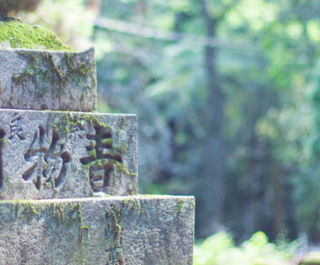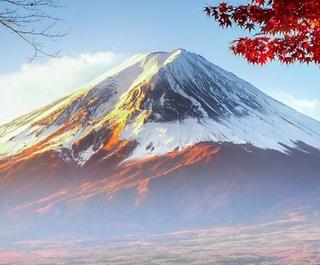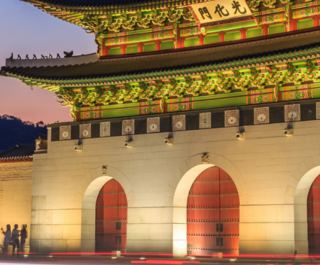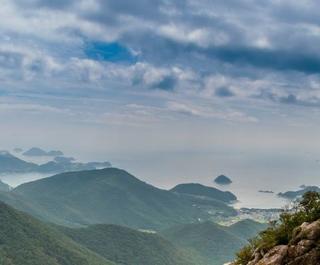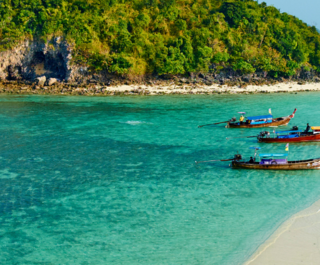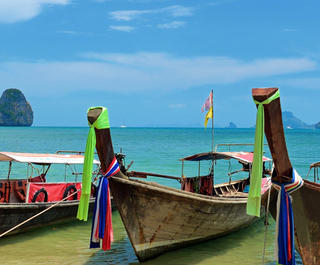
Dancing across the street in Asia usually means dodging the never-ending onslaught of traffic. So busting a move in the middle of a 20-lane highway for a photo opportunity sounds suicidal.
But that’s just what I do in Myanmar’s capital.
Nay Pyi Taw, located midway between Yangon and Mandalay, is the new purpose-built capital of Myanmar (previously Burma). Established on a dry plain amidst impoverished farms and villages the city was constructed (some say hastily) in just five years by the previous ruling military junta and opened in 2005 with the transfer of government ministries and staff.
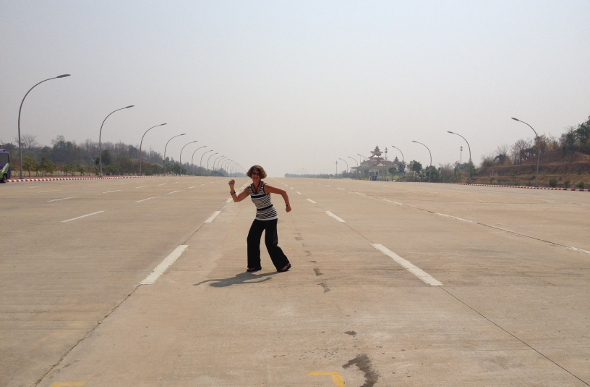 Dancing on the deserted boulevard
Dancing on the deserted boulevard
Grand Scale
Roughly translating as ‘Royal City’ or ‘City of Kings’, Nay Pyi Taw is certainly grandiose, despite its low-rise silhouette, boasting the biggest boulevards in the world (it’s rumoured the avenue in front of parliament is designed for cavalcades and can accommodate an A380).
The city is divided into separate zones; administrative, commercial, hotel and residential, the last also colour-coded depending on seniority and which ministry you work for. It feels a bit disjointed and means transport is essential for getting around.
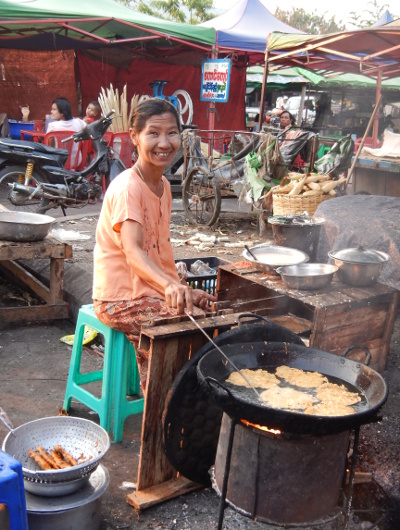 Welcoming smiles are everywhere
Welcoming smiles are everywhere
Yet, bizarrely, the 10-, 16- and 20-lane roads, with roundabouts adorned with enormous lotus flower sculptures, are completely devoid of traffic.
Street sweepers and gardeners, tending blossoming roadside oleanders and bougainvillea, are the only people in sight. Despite having the country’s most reliable electricity, water and internet service, it appears the Burmese are not yet flocking to their new capital.
Beaches off the beaten track. Who Knew? 5 Off-The-Beaten-Track Beach Holidays
You can cruise the river too. Ten of the Best: River Cruise Destinations
A Surreal World
Lonely Planet describes the city as ‘Canberra meets Brasilia with a peculiar Orwellian twist’. It’s certainly surreal; like a huge vacant movie set awaiting life-giving characters, which is what makes it so intriguing.
Since the first democratic election in 2010 restrictions have loosened and Nay Pyi Taw has opened up to foreigners.
The road in front of parliament remains barricaded, but guards have no problem with us taking (long-distance) photos of it, and in a meeting with officials at the Ministry of Hotels and Tourism we learn it will open for guided tours in the near future.
It’s hoped tourism will generate employment for locals and that’s already apparent at Accor Hotels’ new MGallery The Lake Garden, which regularly hosts dignitaries and heads of state.
Elegantly-dressed staff are courteous and professional, testament to the dedication of general manager David Daguise, who recalls no-one spoke English when he arrived to oversee construction of the hotel.
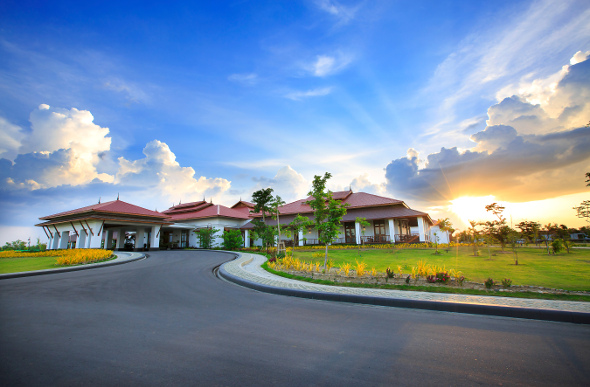 The Lake Garden regularly hosts heads of state
The Lake Garden regularly hosts heads of state
In a city of homogenous, hurriedly-built construction, The Lake Garden exudes quality and craftsmanship in an oasis of manicured gardens. Rich-smelling teak, high ceilings and plantation shutters evoke a contemporary-colonial feel, providing a refined backdrop to a collection of historic Burmese artifacts, personally sourced by Daguise.
The property is expansive, requiring a buggy to reach the swimming pool, which has a serene outlook through tropical gardens to the artificial lake beyond.
The Oak Room is an intimate wine bar, whose signature Lake Garden Cocktail slips down (far too) easily, and Primo, the fine Italian restaurant, is already renowned for its modern Mediterranean food served in an intimate, eclectically-furnished dining room.
Mutual Curiosity
Predominantly a city for bureaucrats, tourists are few and far between and still a curiosity, as we find at Uppatasanti Pagoda. A replica of Yangon’s Shwedagon Pagoda, albeit 30 centimetres shorter, it’s the city’s main attraction, built by General Than Shwe and his wife, in an act of merit-making (improving one’s karma through good deeds).
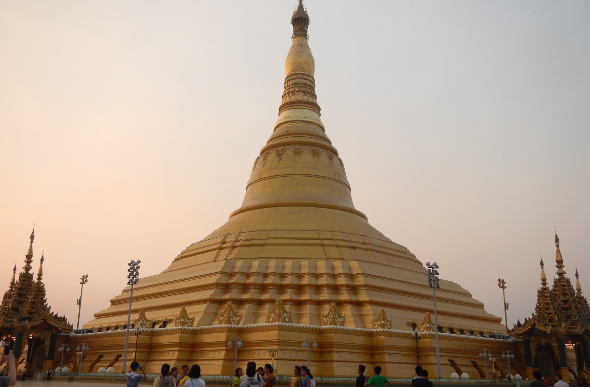 Uppatasanti Pagoda - the city's main attraction
Uppatasanti Pagoda - the city's main attraction
As we photograph locals in traditional longyi (unisex sarong-style skirt) against the glistening stupa, they excitedly capture us on their newly-affordable smart phones, in a mutual giggling photo-fest.
It’s heart-warming to be on the receiving end of genuine interest by people not yet jaded by mass tourism.
Other attractions include the gem museum (home to the world’s largest natural pearl), a water garden (best viewed in the evening when lights and fountains are working), a zoo and safari park.
There’s a shopping centre too, but we head to a local market outside the city.
Pedestrians, bicycles, rickshaws and ox-drawn carts vie with motorbikes and trucks at Ahara Thuka market. Colourful vegetables from the surrounding fields are displayed alongside baskets of aromatic spices, crates of fresh fish and strings of dried meats.
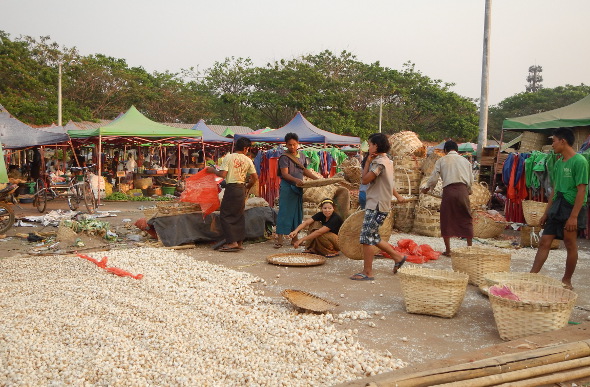 Ahara Thuka Market - a family affair
Ahara Thuka Market - a family affair
It’s a family affair; tossing garlic bulbs in huge threshing baskets, stacking leaves in artful spirals (for wrapping betel nut) and cooking over burning coals.
Babes rest on hips, toddlers amuse each other and young men kick a chinlone, or cane ball, which looks easier than it is when we’re invited to join in.
Don’t come to Nay Pyi Taw for the nightlife – bars and nightclubs are outlawed – but do come for the local people and the once-in-a-lifetime opportunity to see a city in its infancy (and maybe take a selfie on a deserted multi-lane highway).
Who knows what Nay Pyi Taw will look like in 10-20 years’ time?
.........................................................................................................................................................
Visit your local Flight Centre or call 131 600 for more advice and the latest deals on travelling to Nay Pyi Taw.
.........................................................................................................................................................
The writer was a guest of Accor Hotels, Qantas, Jetstar Asia and Exo Travel.


